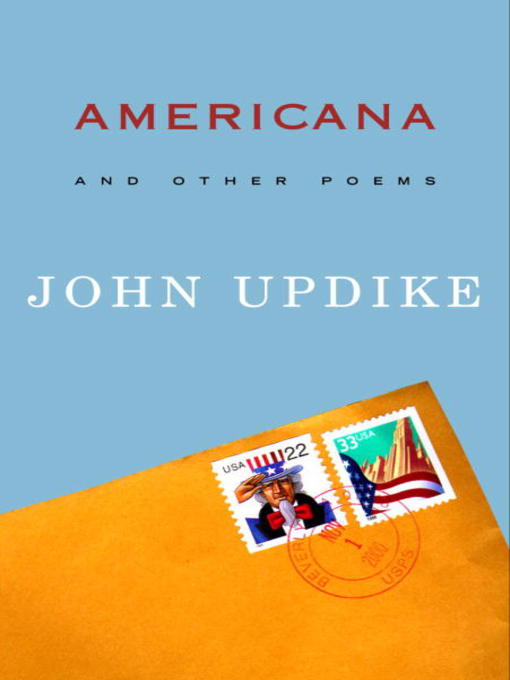
Americana
and Other Poems
- اطلاعات
- نقد و بررسی
- دیدگاه کاربران
نقد و بررسی

May 14, 2001
Anyone who could still call a poem "Two Cunts in Paris" and expect people to laugh or get a touch of frisson is either a novelist or completely out of touch—or both. Checking in with a collection of 60-odd lyrics from the period following his Collected Poems 1953–1993, Rabbit Angstrom creator, New Yorker
mainstay poet-critic and American institution Updike delivers up wryly entertaining verse goods while paradoxically preoccupied with death and failure. "Death in Venice" watches two women try to resuscitate a dying man: "In the minute or two we watched, his face,/ seen upside down like some devil's, turned blue./ My wife thought they were doing it wrong,/ this pair slaving like whores at their client." The speaker of "Two of My Characters" laments "I wanted you to be beautiful, the both of you,/ and, here among real flowers, fear I failed." Yet he seems aware that such musings on others are evasive: "I have time/ at last to consider my life, this its stubby stale end—/ whither, and wherefore, and who says?/ But I fail to." Yet along with the anachronistic gender trouble and crabby melancholia, Updike gives readers a tour of the cities, art works and times of day he has known and loved—and a life, however imperfect, emerges, "cruel as it is beautiful and frail." (May 23)Forecast:Updike is perhaps the
New Yorker's most frequently published poet, so fans will be glad to have a selection of recent work with which they may be familiar.
Rabbit fans who read no other poetry will buy the book if they spot it in-store, particularly given the expansive title.

July 1, 2001
In his first collection since Collected Poems 1953-1993, Updike travels across time and space, beginning appropriately with the frustrating culture of airports and motels, a world of "betweentimes" where the "TV remote/ waits by the bed like a suicide pistol." His tour of American cities includes a stop-over at Shillington, PA, his boyhood home, where a stroll through the graveyard inspires a brilliantly updated version of "Elegy in a Country Churchyard." And although he may express a nostalgic sense of loss for "the days of trolley cars, coal furnaces, leaf fires, knickers, and love from above," he can still vividly encounter the artifacts of the here and now in Scotland, France, Italy, Japan, and Brazil. Suffusing these later poems is an aching sense of mortality, as he feels he is chained to time "as to a wheel." In this highly readable collection of 61 poems his 51st book Updike once again proves himself to be a veritable national treasure. Recommended for all collections. Daniel L. Guillory, Millikin Univ., Decatur, IL
Copyright 2001 Library Journal, LLC Used with permission.

April 15, 2001
That a supremely gifted novelist should also be a highly accomplished poet is fairly rare, but Updike has filled that bill since the beginning of his career. His early poetry was light verse and as such easy to underappreciate. The poems in this collection are something else--not solemn or heavy, but substantial and consequential. They are about the characters of various American airports and cities; about childhood and youth remembered and youthful powers declining; about non-American places, including some in Florida; and about the poet's body and its activities and his mind and its association of things and especially religious ideas. Full of the sharply observed physical and psychological detail expected of a fine novelist, they show sublime ease with that most congenial of English meters, iambic pentameter (with here and there an alexandrine), and proceed naturally, wittily, and musically. Many are unrhymed sonnets. None are bad, and altogether they bespeak a man who loves life and the world and, given his druthers, would never leave them.(Reprinted with permission of Booklist, copyright 2001, American Library Association.)




دیدگاه کاربران